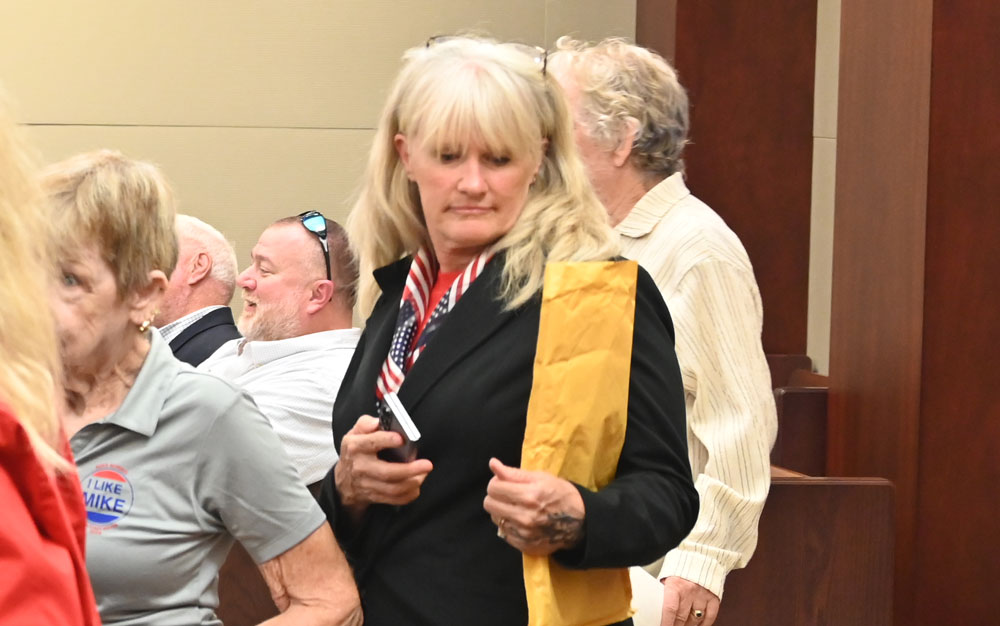
Jeani Duarte, a candidate for the Palm Coast City Council in the 2026 election, on Tuesday evening accused the city of planning a sewer infrastructure that will turn residents into cannibals. She was not correct.
Duarte often addresses the council at its workshops and meetings, often several times a meeting (she did so at least three times Tuesday), often to make statements that are either inaccurate or “nonsensical,” as Circuit Judge Chris France twice termed a civil action she attempted against the city, before France tossed it.
Other members of the public at times make nonsensical statements during public-comment segments before the council or other local governments. The nonsense would not be remarkable unless the person is running for elected office.
Duarte is a 58-year-old retired nutritionist and resident of the C-Section running in District 2, for the seat held by Theresa Pontieri, the vice mayor. Duarte is one of two announced candidates for that seat so far. Tony Amaral Jr. is the other. Pontieri has not said whether she is planning to defend the council seat, only that she will remain in local politics. (Duarte was an applicant to serve on the city’s Charter Review Committee. She was not picked.)
After the council discussed the city’s water supply management plan for 40 minutes, Duarte addressed the council. She spoke for two minutes. She made five inaccurate or misleading statements. Except for one of her statements, she was not corrected after she spoke.
Duarte claimed that Waste Water Treatment Plant 1 in the Woodlands, the city’s oldest, has “plenty of capacity that is not being utilized.” It does not.
As people who have attended council meetings in the past year would have learned (Duarte is usually in attendance) the plant has a capacity of 6.83 million gallons per day. It is typically under capacity during dry month, and over capacity during the wetter months, including a 14 million gallon spike in one day during Hurricane Milton in 2024. It is under a state consent order to expand and modernize. It would not be under a consent order if it had adequate capacity.
In March the council approved spending $168 million just to upgrade the plant to 10.83 million gallons per day, part of a nearly $300 million spending plan for the utility infrastructure in the next five years. Waste Water Treatment Plant 2 just doubled its capacity to 4 million gallons, easing the pressure on WWTP1 and giving it time to expand. (See: “Palm Coast Relieves Itself 3 Years Late as Much-Needed $31 Million Sewer Plant Expansion Doubles Capacity.”)
It’s not clear why, but Duarte then spoke of brackish water, which she defined as “shower water, toilet water, dishwashing water, etc.” That’s not accurate. Brackish water, as Peter Roussel, the utility’s deputy director noted in the only corrective to Duarte that evening, is when freshwater has a certain amount of salt content. The Intracoastal, for example, can be considered brackish water. Duarte may have confused wastewater with brackish water.
Duarte was concerned about the co-location of Wastewater Treatment Plant 2 and Water Treatment Plant 3 (which produces potable water), “so close that their backup generators are housed side by side in the same building.” The suggestion that the co-located generators implied a co-mingling of operations was misleading.
The co-located generators–which enable the plants to be powered for 10 days before refueling, in case of emergencies or long-term power cuts–is a matter of efficiency, as generators are suited to be at the same location for refueling and maintenance. It is no different than if a manure-processing plant and a baby formula plant shared an access road.
“It’s my understanding that the reclaimed wastewater and solids are used for irrigation and fertilizer,” Duarte said. She was right on both counts. The city’s recycled, or “reuse” water is used to irrigate golf courses, lawns and medians. Biosolids generated at the plant are shipped to Merrell Brothers, a company that dries and pasteurizes biosolids into fertilizer pellets.
“This is something that we want to try to get established here in the county in the future,” Danny Ashburn, the manager of wastewater treatment and reuse, said today in a presentation to U.S. Rep. Randy Fine, who was visiting WWTP1. Merrell has a facility in Pasco County. Flagler County could have its own.
Duarte said she’d worked in alfalfa fields in California, where Alfalfa was watered with recycled water–it is the most water-intensive crop–but the alfalfa was only fed to horses. In fact, alfalfa is generally not for human consumption (supplements aside), but for livestock, horses and so on.
Then came the wilder claims. “It is also my understanding that the future vision for these wastewater treatment plants are to reuse the reclaimed water by recycling it back into potable water,” she said, inaccurately. While putting recycled waste to various uses is an ongoing debate–and a common practice on the International Space Station–the city, which doesn’t even fluorinate its water, has no such plans.
“For those of us with religious and spiritual concerns, the thought of consuming reclaimed water from human waste containing human DNA and who knows what,” Duarte said, “is strictly forbidden and runs along the lines of cannibalism. A symptom of cannibalism is madness. I don’t know about the rest of you, but this feels and seems unethical and very evil.”
Cannibalism, which has been around for millennia, has never been linked to causing madness, though in modern times its practice has been associated with a predisposition to mental illness and psychosexual disorders.
Duarte addressed the council one more time later in the evening to say that the nearly $100 million the Legislature appropriated for the “Loop Road” connecting Matanzas Woods Parkway to Palm Coast Parkway, through the empty scrubland west of U.S. 1, should be “reallocated, taken back, and proposed for Waste Water Treatment Plant 1.” That would not be legal.









